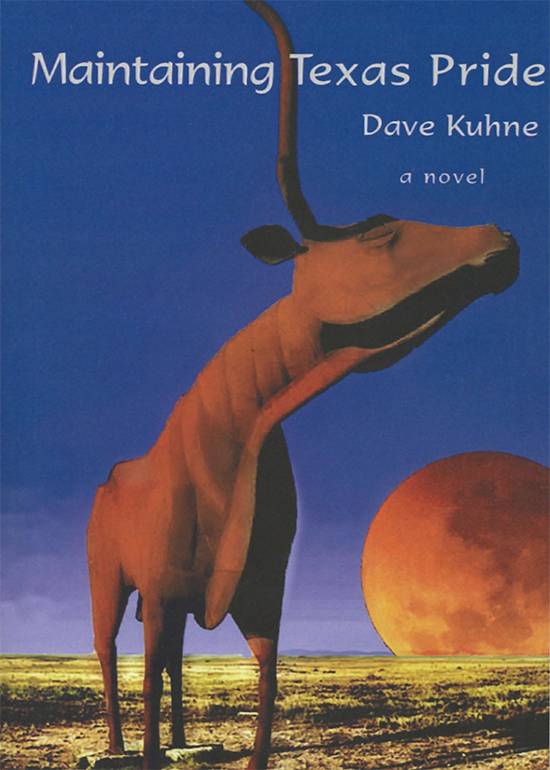
Maintaining Texas Pride
by Dave Kuhne
Beaumont: Lamar University Press, 2020.
154 pp. $17.95 paperback.
Reviewed by
Jennifer Ricks
“With its ‘wind, dust, and irrigated cotton fields,’ the book’s protagonist, Leo, seeks happiness in small-town Texas where he finds a ‘true sense of community, especially compared to the chaos that reigned on the streets of Ft. Worth-Dallas."
A car wash in a big, busy Texas city has uncommon potential for zany anecdotes. Unfortunately, the glimpses readers get into coin-op car wash life is overshadowed by lists of gun types, derogatory stereotypes, and repetitive descriptions. There is a love story to be gleaned, and allusions to magic and fate that pique interest. With its “wind, dust, and irrigated cotton fields,” the book’s protagonist, Leo, seeks happiness in small-town Texas where he finds a “true sense of community, especially compared to the chaos that reigned on the streets of Ft. Worth-Dallas.” Pulling the threads to follow what love story exists is not difficult, but this aspect of the novel feels like it should either be the focus or excluded completely. It does not add the car wash angle but may stand alone as a short story.
In his debut novel, Maintaining Texas Pride, Dave Kuhne uses encounters at a car wash for a series of amusing vignettes. Maintaining Texas Pride follows Leo as he leaves his position as a college English Professor at fictional South East Panhandle State University to becoming the owner of a self-serve car wash in Fort Worth. Texas Pride is the name of the twenty-four-hour car wash Leo inherits from his Uncle Jake and “Maintaining Texas Pride” is written on the journal Leo finds that helps him learn how to run his new business.
Elements of a love story are woven throughout, but the more interesting storylines come from the car wash inherited by protagonist Leo, though most of these are underdeveloped. Opportunities lost include sparce conversations with a stripper who comes to wash her car on her way home from work early Sunday mornings, exchanges with the few part-time employees there, and instances where Leo vaguely references locals who use the car wash as a place to meet and show-off. The result is mostly a series of detached commentaries frequently tinged with judgement. The overall effect is a novel that leaves readers confused by loosely drawn connections and feeling unsettled by questionable descriptions of many of the people who pass through Leo’s life.
As Leo settles into his new career he reflects on the reasons he left teaching, his former girlfriend Pam, and how long-term this new venture may be. The books does not give side characters enough complexity and empathy to match Leo’s musings. Eventually, Pam “the grad student [he]’d been ‘advising,’” whom he describes as “a true Texas woman, a well constructed rodeo queen with big blue eyes that always seemed to be searching the horizon” becomes a love interest. She is a divorcee only a few years younger than Leo. Pam circles back into Leo’s life but her personality is not expanded, again being described as “queen of the rodeo” who broke her leg and lost her scholarship her senior year. Other than her desire to teach in a small town, and her propensity to use quotes as responses, we never learn much more about Pam even as her presence in Leo’s life increases.
Most other characters in the novel are under-developed leaving readers uncertain how to interpret their contributions to furthering the plot. Driving through a Latinex community, Leo states, “except for the fact that the streets were paved and that I could drink the tap water I might have been somewhere in central Mexico…diapered children shared fenced-in back yards with the family chickens, and stray dogs staggered down the alleys like starving drunks.” The exceptions are conversations Leo has with the Veterinarian whose office is next door, exchanges with his neighbor/weed supplier Gene, and a confrontation with an employee who steals from him. Leo makes odd references to the sexual preferences of a rival car wash owner as he describes this business owner, and it is unclear how these statements are meant to be interpreted. The result is uncomfortable.
Ultimately, Maintaining Texas Pride serves as the title of the novel, and as a hint at Leo’s idea of how Texas should be “maintained;” by returning to small-town, ranch-centered living.
Jennifer Ricks is a graduate student at Texas State University
